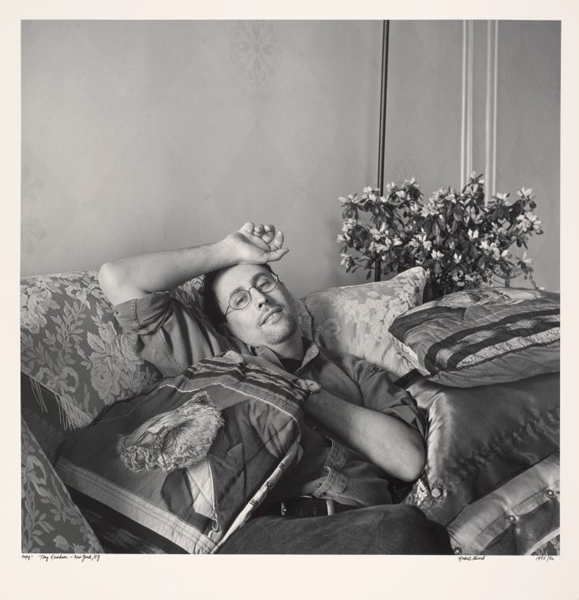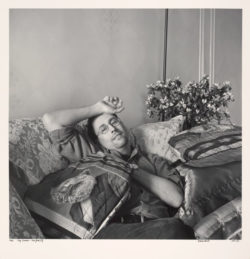Drama/Playwriting
Louisiana drama, like all Louisiana literature, is a rich and diverse subject.

Courtesy of New York Public Library
Tony Kushner with Karl Marx Pillows. Giard, Robert (Photographer)
Louisiana drama, like all Louisiana literature, is a rich and diverse subject. Throughout the state’s history, many prominent and influential dramatists have either been born in Louisiana, written plays in Louisiana, or lived in Louisiana and shown the influence of that experience in their work. As a result, Louisiana has played a significant role in the development of American drama through a variety of dramatists and in a variety of ways.
Nineteenth Century Drama
The beginnings of Louisiana drama lie predate the emergence of English as the dominant language in the region. Perhaps the first Louisiana play, according to scholar Barbara Ewell, was Paul Louis Le Blanc de Villeneufve’s La Fête du Petit Blé, ou L’ Héroisme du Poucha-Houmma, written in 1814. A number of Creole dramatists gained international notice in the early nineteenth century, among them Victor Sejour, a New Orleans-born expatriate writer best known for his short story “The Mulatto” (1837) as well as for his plays The Jew of Seville (1844) and Richard III (1852). Other prominent Creole dramatists of the nineteenth century include Charles Gayarré, Oscar Dugué, and Louis Placide Canonge.
New Orleans began to cement its status as literary center as early as the 1830s and 1840s, when it became a center for dramatic performances rising out of the tradition of Southwestern Humor. Managers such as the Englishman James H. Caldwell and Americans Noah Ludlow and Solomon Smith created traveling companies, based in New Orleans, that would travel the South performing plays, most either Wild West adventures or broad farces. Joseph M. Field, the most notable playwright to emerge from the Southwestern Humor theater movement, wrote a series of broad satires, which were performed at the New St. Charles Theater in New Orleans in the 1840s. In addition to skewering the kinds of targets that appealed to other Southwestern Humorists like Mark Twain and Henry Clay Lewis—self-important religious folk, snake oil salesmen, and other frauds—Field also wrote a critical dramatic response to Harriet Beecher Stowe’s Uncle Tom’s Cabin, which was also performed in New Orleans. The antebellum New Orleans theatrical scene was vital and, particularly in the decade or so preceding the Civil War, sometimes decidedly political.
French-speaking dramatist Louis Placide Canonge was among the most noteworthy of New Orleans’s antebellum political playwrights. A Louisiana-born dramatist and journalist, Canonge, due to his Parisian education and European sensibilities, was regarded among New Orleans society as a model French gentleman. A patron of the arts, Canonge managed the Orleans Theatre in 1860, and created two amateur theater clubs. Most famous among his several plays was Le Comte de Carmagnol (1852), which was successfully produced both in New Orleans and in Paris.
The French Revolution inspired Canonge, a dedicated Republican, to ardent secessionism. In 1850, he wrote France et Espagne, a play that symbolically advocated secession. Using the revolt of the French colonists against Spanish tyranny as a model for secessionist revolt, it fomented opposition to Henry Clay’s compromise on the issue in the United States. While the tone of Canonge’s work is antiaristocratic and ardently democratic, these emotions are coupled with a strident opposition to any change in the condition of African Americans in the South. Canonge’s works stand as examples of the impact of the French Revolution on the drama of French New Orleans, and are indicative of the highly charged, political nature of much of antebellum New Orleans drama.
Tennessee Williams and Lillian Hellman
While New Orleans remained a center for Southern drama after the Civil War, much of the most notable literature in late nineteenth-century Louisiana was fiction by writers such as Kate Chopin, George Washington Cable, Lafcadio Hearn, and Grace King. In the twentieth century, though, Louisiana drama returned to eminence. Arguably the most famous American playwright with a strong Louisiana connection is Tennessee Williams, who came to New Orleans in 1938 in search of employment. New Orleans became central to his work, inspiring him and providing him with characters and topics. Several of Williams’s plays have New Orleans settings, including the well-known 1947 play A Streetcar Named Desire. Streetcar is, in a very real sense, a play about New Orleans, capturing the tensions between the fading traditions of old Southern gentility and the vital, visceral, sometimes brutal, world replacing it. Williams’s 1958 publication, Garden District, which collects two one-act plays set in the titular New Orleans neighborhood, was eventually adapted into the film Suddenly Last Summer. The 1977 play Vieux Carré, published late in Williams’s career, also takes place in New Orleans. A frankly autobiographical account of its unnamed protagonist’s struggles with his identity as a writer and as a homosexual, its takes place against the backdrop of the city that so inspired Williams. While Williams’s works were wide-ranging, New Orleans clearly played an integral role in his development as an artist and in many of his finest plays.
Another prominent Louisiana dramatist of the modern era was Lillian Hellman, born in New Orleans in 1905. Hellman wrote eight plays, two of which—Watch on the Rhine (1941) and Toys in the Attic (1960) —received prestigious New York Drama Critics Circle awards. Hellman’s childhood was split between New Orleans and New York City, and she spent most of her adult life in New York and Martha’s Vineyard. The influence of her Southern upbringing is evident in the fact that six of her eight plays are set in the South.
Most of Hellman’s works dealt, in one way or another, with the problem of evil. Her most famous and successful plays were her first, The Children’s Hour and The Little Foxes. The Children’s Hour, written in 1934, dealt with the [then] scandalous topic of lesbianism: a vicious child accuses the headmistresses of a New England girls’ school of homosexuality, eventually leading to disaster and suicide. The 1939 play The Little Foxes, on the other hand, told the story of three rich brothers and their efforts to find success as capitalists in the small-town South. They succeed admirably, even as their attempt leads them into a series of crimes, culminating in murder. The play is an unflinching, realistic look at the crime and ruthlessness at the heart of their endeavors. Hellman’s other works include Another Part of the Forest (1947) and The Autumn Garden (1951).
Free Southern Theater
In the latter half of the twentieth century, New Orleans was often a center for African American drama. Founded in Jackson, Mississippi, the Free Southern Theater was established to bring theater to traditionally underserved communities, particularly African Americans, in the wake of the civil rights movement. After moving to New Orleans in 1964, the Free Southern Theater, previously a racially integrated group, became more exclusively African American. Playwrights such as Tom Dent, Gilbert Moses, and John O’Neal wrote original plays for production in the Crescent City. With Tom Dent as its chair, the group became a powerful and controversial force for social consciousness and change through drama. In addition to publishing several volumes of poetry, Dent wrote several plays, most notably Ritual Murder, a powerful 1976 commentary on race and violence.
Out of the Free Southern Theater developed BLKARTSOUTH, a writing and acting workshop that eventually broadened to include other genres, with poetry eventually becoming its central focus. The tradition of African American theater in New Orleans remains strong, celebrated by such events as the annual New Orleans Black Theater Festival and continued in the works of such playwrights as Elizabeth Brown Guillory.
Contemporary Louisiana Drama
Tony Kushner is one of the most significant contemporary dramatists with a strong Louisiana connection. Born in New York in 1956, Kushner spent most of his childhood in Lake Charles, before becoming one of today’s most recognized and lauded playwrights. Though he attended college and completed his graduate work in New York, Kushner returned to Lake Charles in the summers. Working with McNeese State University’s Governor’s Program for Gifted Children, he directed productions of his own early works and of canonical plays.
Kushner wrote a pair of successful plays, A Bright Room Called Day and The Illusion, before writing his most famous and critically acclaimed work to date, Angels in America: A Gay Fantasia on National Themes. This epic play is divided into two parts, each focusing on issues of identity during the early years of the AIDS epidemic. The plays won a number of awards, including two Tony awards and a Pulitzer Prize for drama.
Since Angels, Kushner has written numerous plays, most of which draw on issues of cultural, national, and sexual identity. He turned to his Louisiana roots for inspiration for the 2004 play Caroline, or Change, which is set in Lake Charles in 1963.
